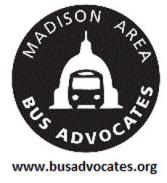






 The Madison Area Bus Advocates will feature on Madison Commons once a month through their column: "The Bus Stops Here." Please enjoy this first installment of the column.
The Madison Area Bus Advocates will feature on Madison Commons once a month through their column: "The Bus Stops Here." Please enjoy this first installment of the column.
This is to introduce you to a citizen group of bus riders and friends called the Madison Area Bus Advocates. We hope that you will join us in our efforts to improve and expand Madison’s bus system. Our main goal is to empower transit riders, people who currently have little voice in a multi-million dollar industry dominated by government and business officials, agency managers, and to a much lesser extent, labor unions.
The Bus Advocates’ interests overlap with those of the others, but differ as well. We all may want the bus to be an efficient, clean, convenient, affordable, and safe means of travel. But the Bus Advocates are tax payers and consumers, not service providers who may reside outside our community.
As a group, we engage in research, education, partnership, and advocacy because we believe that good public transit supports the dignity and freedom of all individuals, creates an open, hospitable and welcoming community, respects the environment, opens economic opportunity to all, and moves people to where they need to go.
The Madison Area Bus Advocates faces challenges on many fronts, however, and the purpose of this column is to, with your help, present the bus rider’s point of view regarding transportation issues that tend to be neglected by other media outlets. We shall raise issues and provide information here, but we also welcome comments, criticisms or suggestions. We want to know how others view the transit system. We want to promote a conversation about buses in Madison.
Accessible transportation, like the bus, has become so intrinsic to our lives in Madison that it is easy to take it for granted. At the end of a long day, it’s hard to gear up to attend a public meeting on transit. But the Madison Area Bus Advocates does not want to leave decision-making on transportation up to the “experts” or take it for granted. It is especially important that our voices be heard because there appears to be a general stigma or bias – even from some transit workers – against people who use public transit instead of a private automobile.
A stigma against bus riders seems odd, because using transit instead of driving benefits the community economically, socially, and environmentally. We utilize less space on roads that are expensive, and only provide temporary jobs while transit provides good long-term jobs. We generate less air pollution (including greenhouse gases) and help reduce traffic congestion. So it is in the public’s interest to support the bus and make it as convenient as possible. Yet some automobile drivers grumble about paying taxes for the bus but often do not even question the need for an increase in their property taxes for new or ever-wider local roads.
A common assumption in Wisconsin often seems to be that people would drive if they could, and that using bus is a last resort. In many places, the public transit system may be so bad that that is true. That is not the case in Madison however. Madison has many “choice riders,” people who could drive but choose to ride the bus instead.
In the end, we have to sympathize with people who are not lucky enough to be able to use transit as an alternative to driving. Our Mission is to increase transit’s accessibility.
In the coming months, this column will detail a combination of issues from our Transit Riders’ Manifesto and Strategic Plan, as well as our past positions and testimony shared in front of City commissions. The column will also discuss other timely issues such as the elimination of some bus stops, which is being proposed in an updated Transit Development Plan.
More specifically, our Manifesto mentions the need for transit riders to be involved in the decision-making that impacts transit, rather than blindly accepting the decisions of the transit agency. It talks about the need for different types of transit to fit the different needs of transit users including: 1) a core service running all the time; 2) extra commuter service at peak times; 3) express service with limited stops; 4) circulators and shuttles; 5) specialized transit for disabled people; and 6) connectors to intercity transport carriers.
We see the need for an intermodal terminal that connects intercity buses and intercity rail with the local bus service. And we would like to move our major transfer points from rather dead places located far away from anything else, to bustling, vibrant centers of commercial and public activity.
Stay tuned for a deeper look at the current issues facing the Madison Metro Transit system and a rider-focused vision for its future.
|
|
|
Welcome to the Madison Commons, a website designed to provide news and information about all of Madison's neighborhoods and a crossroads for the discussion of community issues. The name comes from the idea of a village commons, a place for news, talk, debate, and some entertainment, too, that's open to everyone.
All rights reserved. Read more about the Madison Commons and its partners.

